- Home
- Charles de Lint
Moonlight and Vines Page 2
Moonlight and Vines Read online
Page 2
3
I have a friend who owns a bookstore just outside of the city and knows everything you’d ever want to know about literature, high-brow and low. She’s the one who first turned me onto Michael Hannan and Jeanette Winterson. The first time I read Barry Lopez was because Holly sent me a copy of River Notes. We don’t get together as much as either of us would like, but we’ve been corresponding for years—most lately by e-mail—and talk on the phone at least once a week. She’s in love with books, and knows how to share that love so that when she tells you about a certain writer or book’s merit, you immediately want to read it for yourself. More importantly, she’s usually dead on the money. Holly’s the only reason I still look at the Saturday book pages in The Daily Journal since Aaran took them over.
With her expertise in mind, I call Holly up after breakfast to see if she knows anything about Saskia and her poetry.
“What’s her last name?” Holly asks.
I can picture her sitting at the big old rolltop desk that doubles as a sales counter in her store, a small figure in jeans and a sweater, long, dark red hair pulled back from her forehead with a pair of bobby pins, hazel eyes always bright with interest. You could come in looking for Les Misérables or a nurse romance and she’d treat you with the same courtesy and respect. The store is crammed with books, literally, floor to ceiling. They gather like driftwood in tall stacks at the ends of bookcases, all around and upon her desk, in boxes and bags, filling the front window display except for the small cleared area where her Jack Russell terrier, Snippet, lies watching the street when she’s not ensconced on Holly’s lap. The sign painted onto the window, Gothic lettering, paint flaking, simply reads, HOLLY RUE, USED BOOKS.
I think about what she’s just asked me and realize I don’t know.
“Well, Saskia’s unusual enough,” Holly tells me. “Hang on while I go online.”
Holly and some friends have been creating this huge database they call the Wordwood somewhere out in the Net, assuring themselves that the Information Highway will remember the old technologies—books and printing presses were marvels of technological import in their day, after all—at the same time as it embraces the new. I don’t know how many of them are involved in the project, but they’ve been working on it for years. The Net connects them from every part of the world, each participant adding book titles, authors, bios, publishing histories, reviews, cross-references and whatever else they might think is pertinent to this amazing forest of information they’ve cultivated.
I tried logging on once when I was out visiting Holly and lost an afternoon glued to the screen, following some arcane trail that started with a short story by Sherman Alexie that I was trying to track down and ended up in a thicket of dissertations on Shakespeare’s identity. Holly laughed at me when I finally came up for air. “The Wordwood’s like that,” she tells me. “One of these days I’m going to go in there and forget to come back.” The way she talks about the place it’s as though she actually visits it.
“Got something,” she tells me. “Her last name’s Madding, but she only uses her given name for a byline. We’ve got three titles listed—hey, wait a minute. I think I have one of these.” I hear her get up from her chair and go looking for it, roam-phone in hand, because she’s still talking to me. “Yeah, here it is. It’s called Mirrors and it’s her, let me see, second collection.” More shuffling noises as she makes her way back to the desk and looks through the book. “You want me to read one to you? They’re all pretty short.”
“Sure.”
“Okay. Here, I’ll just do the first one, ‘Tarot.’ ”
What she said:
You turn from me
as I turn
from the cards
refusing to face
what we see.
Holly’s got this amazing speaking voice, rough and resonant, like it’s been strained through years of whiskey and cigarettes, though she doesn’t smoke or drink. It gives the poem an edge that I’m not sure would be there if I’d just taken the words from the page.
“Nice,” I say. “It sneaks up on you, doesn’t it?”
“Mmm. There’s a lot of sadness in those few lines. Oh, this is cool.”
The word’s just come back in fashion, but Holly never gave it up. She’s been known to say “far out” as well.
“What’s that?” I ask.
“I was looking back at the Wordwood and I see she’s involved with Street Times. She does some editorial work for them.”
That is interesting. Street Times is a thin little paper produced for street people to sell in lieu of asking for spare change. You see them selling it on half the corners downtown. The vendors pay something like fifty cents an issue and whatever you give them above that is what they earn. Most of the material is produced by the street people themselves—little articles, cartoons, photographs, free classifieds. Every issue they run a profile of one of the vendors, seriously heartbreaking stories. Jilly and some of her friends do free art for it occasionally and I remember Geordie played at a benefit to raise the money to set the whole thing up a couple of years ago.
“I wonder who entered this stuff on her,” Holly asks.
The question’s rhetorical. Considering how many people are involved in building and maintaining the Wordwood, it could be anybody.
“So you want me to keep this book for you?” she goes on.
“Sure.”
I’m too intrigued to even ask the price.
“Should I put it in the mail or are you actually going to visit me for a change? It’s been months.”
“Five weeks, if you’re counting,” I say.
“Who’s counting?”
“I’ll be by later today if I can catch a ride with someone.”
“There are buses that come out this far,” she says with a smile in her voice.
“If you don’t mind walking the last couple of miles.”
“That’s right, I forgot. You’re an artiste and need to be chauffeured. So is she cute?”
Sometimes Holly’s abrupt changes of topic throw me. You’d think I’d get used to it, hanging around with Jilly who can be worse, but I never do. Conversations between her and Holly are bewildering for common folk to follow.
“What do you mean, cute?” I ask.
“Oh, come on. You’re calling up, looking for books by someone whose last name you don’t even know and then—and this is the real giveaway—you don’t even ask how much the book is. She’s got to be cute.”
“Maybe I’m just stimulated by her, intellectually.”
I can almost see her shake her head. “Uh-uh. It’s a guy thing, Christy. I know I’ve called you an honorary woman in the past, but you’re still a guy. A single guy, yet.”
So I tell her about last night.
4
It starts with a heartbeat, rhythm laid down, one-two, one-two, deep in your chest. It’s not the pulse of everyday life but something that runs more profound, a dreaming cadence, a secret drumming that you can’t share at first, not with anyone and especially not with her. The melody and chordal patterns might come later, when you’ve first made contact, when you discover that you haven’t made an utter fool of yourself and she might actually reciprocate what you feel, adding her own harmonies to the score tattooed across your heart.
For now, all you can do is repeat her name like a mantra.
Saskia Madding. Saskia Madding. Saskia . . .
For now, it’s all unrequited. New Age washes of sound when you think of her, great swelling chords if you happen to catch her going about her business. There, across the street, walking briskly in a light rain, skin glistening, hair feathered with moisture. There, squeezing melons at a fruit vendor’s stall, laughing at something the man’s said, standing with one hip jutted out, leaning over the front of the stall. There, leafing through a magazine in a smoke shop, a brief glimpse of her on the other side of the glass before you force yourself to walk by.
The music thunders in your ch
est. Nothing with structure. Nothing that can be transcribed or scored. But it leaves you helpless before its tumultuous presence, desperate to breathe.
5
I’ve read Mirrors a half-dozen times since Sue drove me by Holly’s to pick it up. I’ve got Holly doing book searches for the other two collections. I’ve been by Angel’s walk-in on Grasso Street and gone through her back issues of Street Times. I’ve even got my own modem hooked up—the one the professor gave me that’s been languishing unused in a drawer of my desk for the past few months—entering the Wordwood myself to see if I can find some trace of her that Holly might have missed. A bio. A review. Anything.
In short, I’ve become obsessed with Saskia Madding.
I couldn’t meet her now if I wanted to because I’ve become too desperate and there’s nothing quite so pathetic or off-putting as the scent of desperation. It clings to you like a second skin, a nimbus of melancholy and pathos that, contrary to the Romantics with their marble skin and pining eyes, adds nothing to your attractiveness. You might as well have “Avoid me, I’m so hopeless” stenciled on your brow.
“The problem,” Holly tells me the next time we’re talking on the phone, “is that you’re treating her no better than Aaran or Jenny do. No, hear me out,” she says when I try to protest. “They’ve got their misconceptions concerning her and you’re blithely creating your own.”
“Not so blithely,” I say.
“But still.”
“But still what?”
“Don’t you think it’s time you stopped acting like some half-assed teenager, tripping over his own tongue, and just talked to her?”
“And say what?” I ask. “The last time I saw her was at that launch for Wendy’s new book, but before I could think of something to say to her, Aaran showed up at my elbow and might as well have been surgically implanted he stayed so close to me. She probably thinks we’re friends and I told you how he feels about her. I don’t doubt that she knows, too, so what’s she going to think of me?”
“You don’t have to put up with him,” Holly says.
“I know. He was on about her half the night again until I finally told him to just shut up.”
“Good for you.”
“Yeah, Geordie’d be proud, too. Wait’ll Aaran reviews my next book.”
“Does that bother you?” Holly asked.
“Not really. What bothers me is that I can’t get her out of my head, but I can’t even find the few ounces of courage I need to go up to her. Instead I just keep seeing her everywhere I go. I feel like I’m being haunted, except I’m the one playing the stalker and I’m not even doing it on purpose. She’s probably seen me as often as I’ve seen her and thinks I’m seriously twisted.”
“A dozen pieces of advice come to mind,” Holly says, “but they’d all sound trite.”
“Try one on me anyway. I need all the help I can get.”
Sitting there in my apartment, receiver cradled against my ear, I can picture Holly at her desk in the bookshop. The image is so clear I can almost see her shrug.
“Just go up to her,” Holly tells me. “Ask her if she wants to go for a coffee or something. The worst she can do is say no.”
6
I love the poems in Mirrors. They’re as simple as haiku and just as resonant. No easy task, I know. Every so often I turn from prose to verse, but under my direction the words stumble and flail about on the page and never really sing. I sit there and stare at them and I can’t fix them. Give me a pageful of the crappiest prose and some time and I can whip it into shape, no problem. But I don’t know where to begin with poetry. I know when it doesn’t work. I even know what makes it work in someone else’s lines. But I’m hopeless when it comes to trying to write it myself.
Saskia’s poems are filled with love and sadness, explorations of social consciousness, profound declarations and simple lyric delights. The same small verse can make me smile and weep, all at the same time. But the one that haunts me the most, the one I return to, again and again, is “Puppet.”
The puppet thinks:
It’s not so much
what they make me do
as their hands inside me.
In what shadows did those words grow? And why wasn’t I there to help her?
That makes me laugh. I can’t even get up the nerve to approach her and I expect to protect her from the dangers of the world?
7
In the end it’s my brother Geordie, of all people, who introduces her to me. We’re sitting on the patio of The Rusty Lion on a Sunday afternoon, trying to do the familial thing that neither of us is much good at, but at least we try. Jilly always says the family we choose for ourselves is more important than the one we were born into; that people have to earn our respect and trust, not have it handed to them simply because of genetics. Well, blood ties aside, I’d still want Geordie as my brother, and I think he’d want me, but we’ve got so much weird history between us that our good intentions don’t always play out the way we’d like them to. Every time we get together I tell myself I’m not going to rag him, I’m not going to be the know-it-all big brother, I’m not going to tell him how to live his life, or even suggest that I know better. Trouble is, we know each other too well, know exactly which buttons to push to get under each other’s skin and we can’t seem to stop doing so. Bad habits are the hardest to break.
We immediately start off on a bad foot when he orders a beer and I hear myself asking if he doesn’t think a few minutes past noon is a little early for alcohol. So he orders a whiskey on the side, just to spite me, and says, “If you’re going to have a cigarette, could you at least not blow the smoke in my face?” We’re sitting there glowering at each other and that’s when Saskia comes walking by, looking like she stepped out of an Alma-Tadema painting for all that she’s wearing jeans and a baggy blue sweater that perfectly matches her eyes.
Geordie’s face brightens. “Hey, Sass,” he says. “How’s it going?”
I’ve had this mantra going through my head for weeks now—Saskia Madding, Saskia Madding—and all of a sudden I have to readjust my thinking. Her friends call her “Sass”? And how’d Geordie become one of them?
She smiles back at my brother. “Taking the day off?” she asks.
I have to give Geordie this: He works hard. He may play in a half-dozen bands and meet his rent and utilities by busking on street corners, but lazy he’s not. Suddenly I want to tell him how I blew Aaran off the other night and didn’t care what it might mean about how I’d get reviewed in the Journal in the future. I want to know if he’s ever talked to Saskia about me, and if he has, what he’s said. I want to ask Saskia about “Puppet” and a half-dozen other poems from Mirror. Instead, I sit there like a lump with a foolish grin. Words are my stock and trade, but they’ve all been swallowed by the dust that fills my throat. I find myself wiping the back of my hand across my brow, trying to erase the “Avoid me” I know is written there. Meanwhile, Geordie’s completely at his ease, joking with her, asking her if she wants to join us. I wonder what their relationship is and this insane feeling of jealousy rears up inside me. Then Saskia’s on the patio, joining us. Geordie’s introducing us. My throat’s still full of dust and I wish I’d ordered a beer as well instead of my caffè latte.
“So that’s who you are,” Saskia says as she sits down in the chair between Geordie’s and my own. “I keep seeing you around the neighborhood.”
“He’s the original bad penny,” Geordie says.
A part of me feels as though I should be angry with him for saying that. I wonder does he really mean it, have we drifted that far apart? But another part of me feels this sudden absurd affection for him for being here to introduce Saskia and me to each other. Against the rhythm of my pulse, I hear the first strains of melody, and in that instant, everything is right with the world. The desperate feeling in my chest vanishes. My throat’s still dry, but the dust is gone. My features feel a little stiff, but my smile is natural.
“I�
�ve seen you, too,” I find myself saying. “I’ve been wanting to meet you ever since I read Mirrors.”
Her eyebrows arch with curiosity. “You’ve actually read it?” she asks.
“A number of times. I’ve tried to find your other two collections, but so far I haven’t had any luck.”
Saskia laughs. “I don’t believe this. Newford’s own Jan Harold Brunvand not only knows my work, but likes it, too?”
It never occurred to me that she might have read any of my books.
“Okay,” Geordie says. “Now that we’ve got the mutual admirations out of the way, let’s just try to enjoy the afternoon without getting into a book-by-book rundown of everything the two of you have written.”
He seems as relaxed as I am, but I’m not surprised. We always do better in other people’s company. It’s not that we feel as though we have to put on good behavior. For some reason we simply don’t pick at each other when anybody else is around. He also reads voraciously and loves to talk about books—that’s probably the one thing we really have in common beyond the accident of our birth—so I know he’s kidding us. I wish we could always be this comfortable with each other.
We both love books, only I’m the one that writes them. We both love music, only he’s the musician. That makes us something of a rarity in our family. It wasn’t that our parents didn’t care for culture; it’s just that they didn’t have time for it. Didn’t have time for us, either. I’m not sure why they had children in the first place and I really don’t know why they had three of us. You’d think they’d have realized that they weren’t cut out to be parents after our older brother Paddy was born.
The only thing they asked of us was that we be invisible which was like an invitation to get in trouble because we soon learned it was the only way we’d get any attention. None of us did well in school. We all had “attitude problems” which expanded into more serious run-ins with authority outside of school. The police were forever bringing us home for everything from shoplifting (Geordie) and spray-painting obscenities on an underpass (me) to the more serious trouble that Paddy got in which eventually resulted in him pulling ten-to-fifteen in a federal pen.

 Widdershins
Widdershins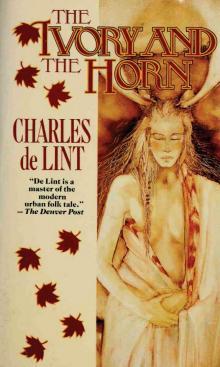 The Ivory and the Horn
The Ivory and the Horn Yarrow
Yarrow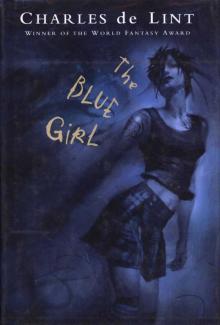 The Blue Girl
The Blue Girl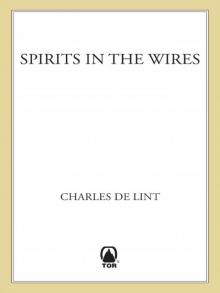 Spirits in the Wires
Spirits in the Wires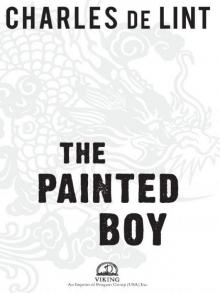 The Painted Boy
The Painted Boy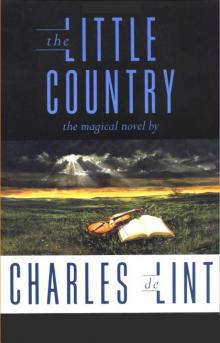 The Little Country
The Little Country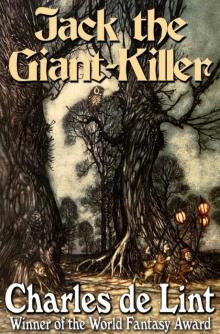 Jack of Kinrowan: Jack the Giant-Killer / Drink Down the Moon
Jack of Kinrowan: Jack the Giant-Killer / Drink Down the Moon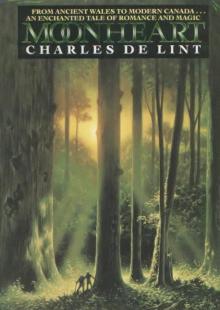 Moonheart
Moonheart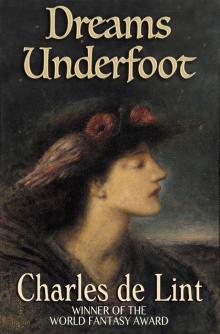 Dreams Underfoot
Dreams Underfoot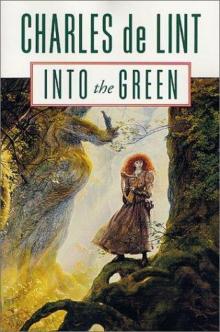 Into the Green
Into the Green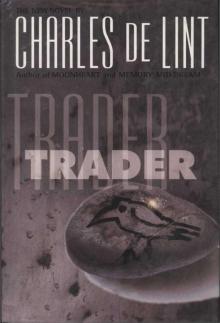 Trader
Trader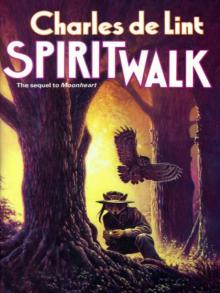 Spiritwalk
Spiritwalk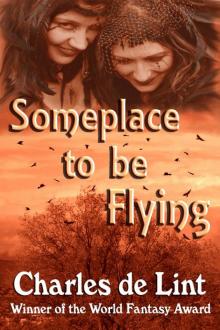 Someplace to Be Flying
Someplace to Be Flying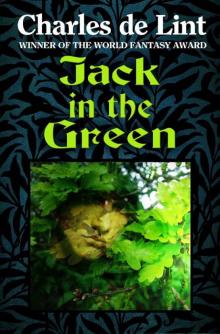 Jack in the Green
Jack in the Green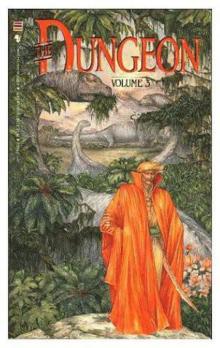 The Valley of Thunder
The Valley of Thunder Out of This World
Out of This World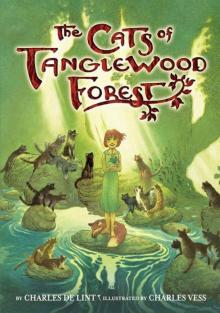 The Cats of Tanglewood Forest
The Cats of Tanglewood Forest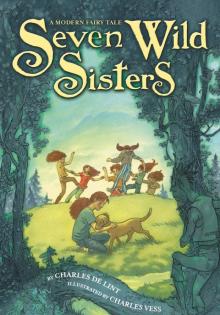 Seven Wild Sisters
Seven Wild Sisters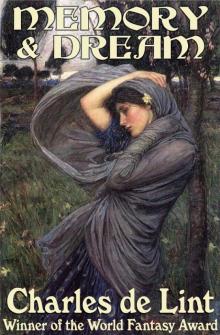 Memory and Dream
Memory and Dream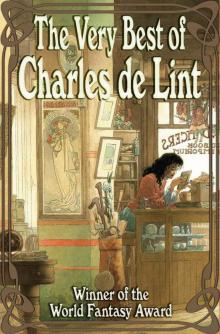 The Very Best of Charles De Lint
The Very Best of Charles De Lint Under My Skin
Under My Skin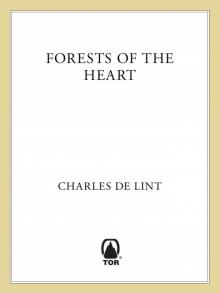 Forests of the Heart
Forests of the Heart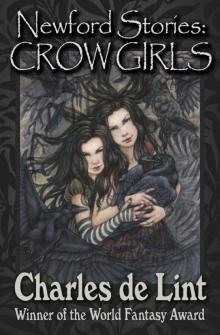 The Newford Stories
The Newford Stories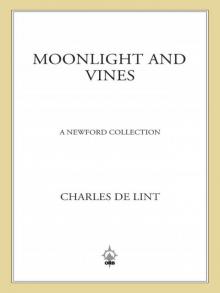 Moonlight and Vines
Moonlight and Vines Angel of Darkness
Angel of Darkness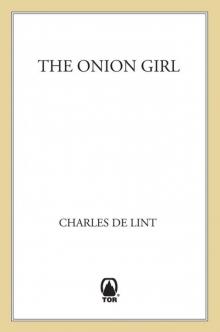 The Onion Girl
The Onion Girl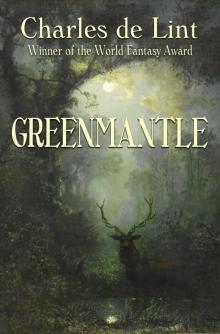 Greenmantle
Greenmantle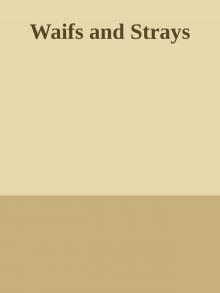 Waifs And Strays
Waifs And Strays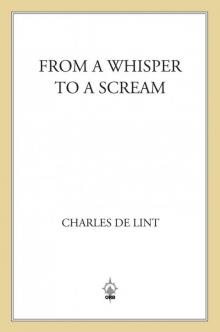 From a Whisper to a Scream
From a Whisper to a Scream Over My Head
Over My Head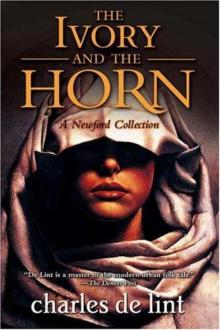 The Ivory and the Horn n-6
The Ivory and the Horn n-6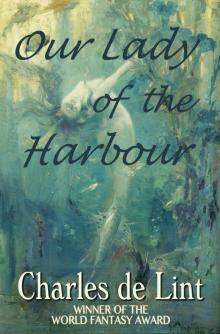 Our Lady of the Harbour
Our Lady of the Harbour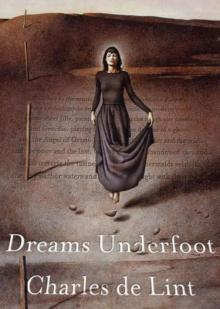 Dreams Underfoot n-1
Dreams Underfoot n-1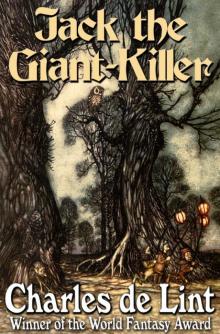 Jack the Giant-Killer (Jack of Kinrowan Book 1)
Jack the Giant-Killer (Jack of Kinrowan Book 1)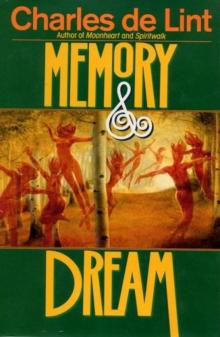 Memory and Dream n-5
Memory and Dream n-5 Under My Skin (Wildlings)
Under My Skin (Wildlings)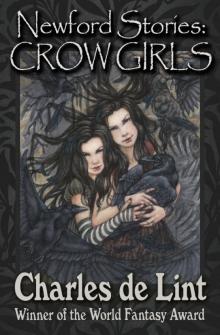 Newford Stories
Newford Stories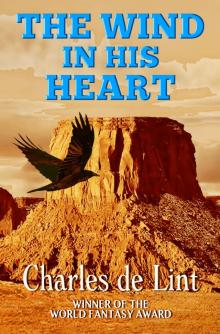 The Wind in His Heart
The Wind in His Heart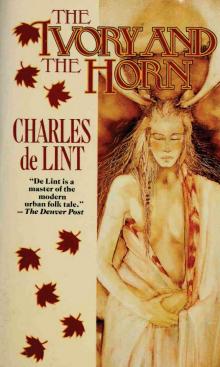 Ivory and the Horn
Ivory and the Horn